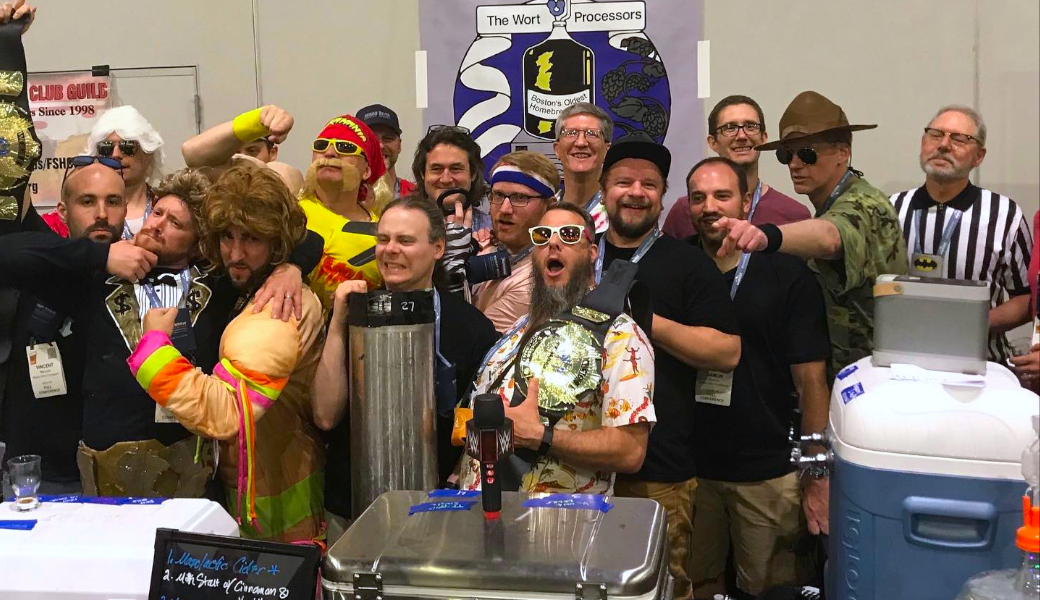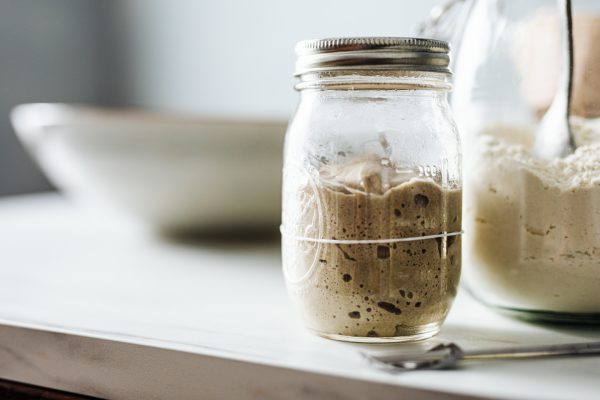
[Above: members of the Boston Wort Processors pose for a picture at their club’s booth during Homebrew Con 2019 in Providence, Rhode Island]
By Matt Bolling, American Homebrewers Association
When the Boston Wort Processors decided to find a new way to showcase all the hardware their members had been racking up in local and regional homebrew competitions, they called upon club member Ian Anderson to put together a digital trophy case. Ian, a software engineer at GitHub, had been a member of the club for several years and jumped at the opportunity to put his professional skills to work and develop the code for the trophy case.
“The club’s steering committee was hoping to find a new way to foster a friendly sense of competition within the club,” said Ian, “They wanted a single place to not only track all of the club members’ accomplishments, but also a cool way to show it off. So, I put together a prototype using some feedback from the committee, and we launched it just a few years ago.”
The Worts Trophy Case includes a weighted scoring system to further encourage club members to brew more frequently and enter their beers into competitions. The more medals a member wins, the more points they build throughout the club’s brewing “season,” which runs July 1 to June 30 annually. The scoring system is organized with bonus points for brewers who place in the National Homebrew Competition (NHC).
Any club member can log into the trophy case with their email address and add their medals. Though it took a while to catch on with the club’s membership, the trophy case quickly gained popularity after regular competition entrants began encouraging other club members to compete. Now in its second full year, the trophy case has become synonymous with the club.
Boston Wort Processors member Mark Keck took home bragging rights as the club’s overall points leader during the 2018–2019 inaugural season, tallying 56 points by winning 27 medals in 10 competitions that year.
“I’m borderline unhealthily competitive. That damn trophy case may saddle me with eternal debt, but it’s a whole lot of fun!” said fellow Boston Wort Processors member Ross Druckenmiller, who is currently tied with Ian for second place for the 2019–2020 season.
The trophy case has been a huge hit within the Boston Wort Processors, and the club has seen a resulting bump in new members attending their meetings.
“A few people have joined [the Boston Wort Processors] specifically because they see our club listed as winners at NHC and other local competitions. That is great publicity for our club since it proves that we have a lot of accomplished brewers,” added Ian. “It’s been fun to watch the trophy case leaderboard fill up with more people this year, which means that it’s accomplishing our intended goal: more of our club members are entering competitions—and winning! Last year, the club collectively won 150 medals.”
Ian hopes the trophy case will lead to more opportunities to encourage club members to compete and learn. Potential future plans for the trophy case include a statistics page to track the BJCP categories the club wins in the most often and, perhaps more importantly, the categories they do not often win.
“It would be fun to have a collective goal for the club to medal in every category at some point throughout the season,” said Ian. “We might even add a multiplier to make those categories worth more points. That way, the club has a more collective goal to reach rather than everyone simply competing against each other. We could even use it to identify some topics that we can cover as education at club meetings. There is a lot of potential.”
Although many clubs already track medals won by club members, showcasing those accomplishments in a digital trophy case is unique to the Boston Wort Processors. That could change, though.
“One of the benefits to hosting the trophy case code on GitHub is that it is completely open source. Any club can use it.” Ian continued, “However, you might need someone with a little background in coding to adapt it to your club. There’s no current precedent for other clubs using it, but I’m happy to chat with anyone who is interested.”
You can get the Boston Wort Processors Trophy Case source code via their GitHub repository.
Ian is currently in second place in the club’s trophy case standings. His festbier, Anderfest, won best of show out of 337 entries at the Southern New England Regional Homebrew Competition in October 2019.
Access the Anderfest recipe on HomebrewersAssociation.org!



Share Post